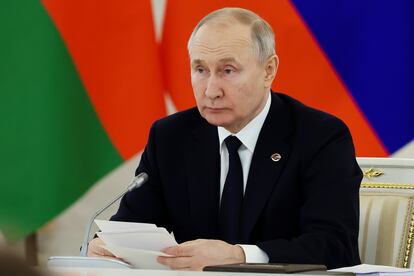Putin hold talks on defense and economic ties with Lukashenko
The Russian president said there would be “close work” on boosting cooperation under a union agreement that envisions close political, economic and military ties between Belarus and his country

Russian President Vladimir Putin and his Belarusian counterpart on Thursday discussed expanding economic cooperation and bolstering defense ties between their nations, which include a plan to deploy Russia’s nuclear weapons to Belarus amid the fighting in neighboring Ukraine.
The Kremlin talks involved senior officials from both countries and followed Putin’s one-on-one meeting with President Alexander Lukashenko on Wednesday.
Putin said there would be “close work” on boosting cooperation under a union agreement that envisions close political, economic and military ties between Belarus and Russia.
Russia used Belarusian territory as a staging ground for invading neighboring Ukraine and has maintained a contingent of troops and weapons there.
Last month, Putin declared that Moscow planned to put some of its tactical nuclear weapons in Belarus, an announcement that marked another attempt by the Russian leader to dangle the nuclear threat to discourage the West from supporting Ukraine.
Such weapons are intended to destroy enemy troops on the battlefield and have a relatively short range and a much lower yield compared with nuclear warheads fitted to long-range strategic missiles, which are capable of obliterating whole cities.
The deployment of Russian tactical nuclear weapons to Belarus would put them closer to potential targets in Ukraine and NATO members in Eastern and Central Europe. Belarus shares a 1,250-kilometer (778-mile) border with NATO members Latvia, Lithuania and Poland.
Belarus Security Council Secretary Alexander Volfovich told reporters after Thursday’s talks that there’s no military requirement to deploy tactical nuclear weapons near the border with Belarus’ neighbors. He said that during Soviet times, there were 43 nuclear weapon facilities across the country and that “all of them have been preserved.”
Belarus, Kazakhstan and Ukraine had Soviet nuclear weapons stationed in their territory. Those weapons were returned to Russia after the 1991 collapse of the Soviet Union.
Volfovich said it was up to the two presidents to set a date for the deployment of Russian nuclear weapons to Belarus.
Putin previously said that construction of storage facilities for tactical nuclear weapons would be completed in Belarus by July 1. Russia also has helped modernize Belarusian warplanes to adapt them to carrying nuclear weapons and provided the country with Iskander short-range missiles that could be fitted with a nuclear warhead. Their crews started training in Russia this week.
In opening remarks at Thursday’s talks, Lukashenko warned that “if necessary, we will use all we have to protect our countries and peoples.”
“We aren’t blackmailing anyone. It will be so,” he added.
Last week, Lukashenko said that some of Russia’s strategic nuclear weapons might also be deployed to Belarus along with part of Moscow’s tactical nuclear arsenal. He made no reference to such a development during the Kremlin meeting, and Putin’s spokesman Dmitry Peskov said it wasn’t discussed on Thursday.
It would make little sense for the Kremlin to deploy any of its nuclear-tipped intercontinental ballistic missiles on Belarusian territory since they could reach any target globally from their current positions in Russia.
Lukashenko mentioned the arrest of a man accused of launching a recent drone attack that damaged a Russian early warning and control aircraft based in Belarus. Belarusian security agencies are working to uncover caches containing weapons and explosives, he added.
The Belarusian leader cited the importance of close defense cooperation and asserted that Belarusian factories have developed the expertise to replace Western companies as a source of electronic components for Russian weapons.
“We oriented ourselves toward the West in the past, but now we have come to realize that they aren’t our friends and we need to produce all that ourselves,” Lukashenko said.
Lukashenko has been in power for nearly 29 years, relentlessly cracking down on dissent and relying on Russian subsidies to run Belarus’ Soviet-style economy. Moscow’s support has helped him weather months of massive protests against his re-election in an August 2020 vote that was rejected by the opposition and the West as rigged.
Sign up for our weekly newsletter to get more English-language news coverage from EL PAÍS USA Edition
Tu suscripción se está usando en otro dispositivo
¿Quieres añadir otro usuario a tu suscripción?
Si continúas leyendo en este dispositivo, no se podrá leer en el otro.
FlechaTu suscripción se está usando en otro dispositivo y solo puedes acceder a EL PAÍS desde un dispositivo a la vez.
Si quieres compartir tu cuenta, cambia tu suscripción a la modalidad Premium, así podrás añadir otro usuario. Cada uno accederá con su propia cuenta de email, lo que os permitirá personalizar vuestra experiencia en EL PAÍS.
¿Tienes una suscripción de empresa? Accede aquí para contratar más cuentas.
En el caso de no saber quién está usando tu cuenta, te recomendamos cambiar tu contraseña aquí.
Si decides continuar compartiendo tu cuenta, este mensaje se mostrará en tu dispositivo y en el de la otra persona que está usando tu cuenta de forma indefinida, afectando a tu experiencia de lectura. Puedes consultar aquí los términos y condiciones de la suscripción digital.








































